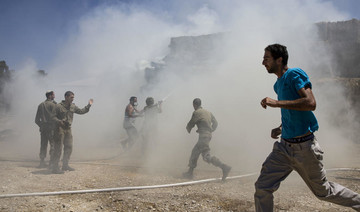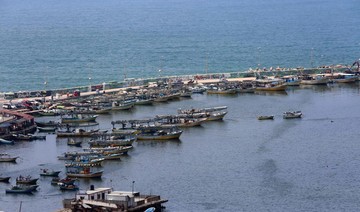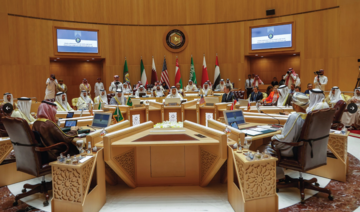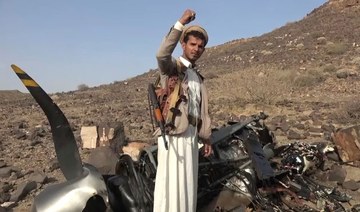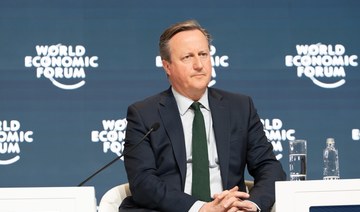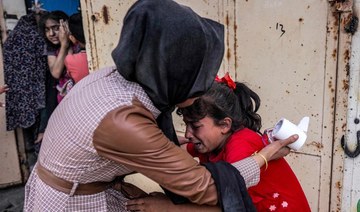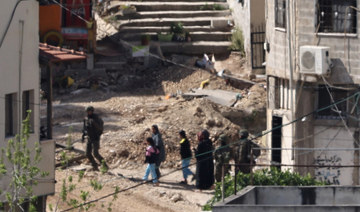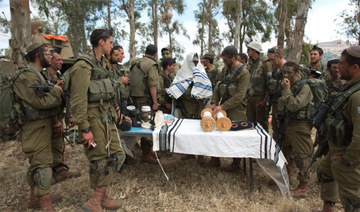GAZA CITY: Hadil Al-Rafati gently adjusts her anaemia-stricken toddler’s frail legs onto her lap in the lobby of an NGO’s clinic in Gaza City.
The program providing treatment to her son is among those in the enclave facing cuts or closure due to a freeze on US aid to the Palestinians, organizers say.
“He weighs 7.2 kilogrammes (16 pounds), but at a year and a month, he should be at least 10,” the 21-year-old mother said of her son, Essam.
Since January, US financing for humanitarian programs serving the Palestinians has been suspended, with Washington saying it is being reviewed.
President Donald Trump has threatened to withhold hundreds of millions of dollars in aid to force the Palestinians back to the negotiating table with Israel.
On a recent day, around 15 mothers waited in the lobby of the clinic run by Palestinian organization Ard Al-Insan to see a paediatrician or to receive food supplements for their children.
Certain services have been maintained with available funding, but the program is due to expire at the end of August if the money is not released.
“They help us, give us medicine,” said Rafati, who is unemployed and whose husband picks up odd jobs to make ends meet.
“If they close, where will we go?“
The Gaza Strip, controlled by Islamist movement Hamas, has been under an Israeli blockade for more than 10 years. The two sides have fought three wars since 2008.
Some 80 percent of the enclave’s two million residents rely on aid, according to the UN agency for Palestinian refugees (UNRWA).
Trump’s comments on aid in January came after Palestinian leaders suspended relations with the White House over its deeply controversial recognition of the disputed city of Jerusalem as Israel’s capital.
Since then, the passage of a US law in March withholding certain aid to the Palestinians over payments made to prisoners jailed for security offenses, or to the families of those killed while carrying out attacks against Israelis, has further complicated the situation.
Some $215 million (183.5 million euros) that the United States was to invest in humanitarian aid and development in the occupied West Bank and Gaza Strip has been held up, according to an analysis for the US Congress.
US financing for UNRWA has also been blocked.
“At President Trump’s direction, assistance to the Palestinians remains under review,” a US State Department official said.
Some programs are already facing cuts, such as the Palestine Avenir for Childhood Foundation, which has not renewed contracts for some 30 employees since the start of the year.
Suffering from cerebral palsy, nine-month-old Maher had been receiving four physiotherapy sessions per week from the organization.
He now only comes twice per week due to a lack of available therapists.
“The change has been huge in the last three months,” said his mother Nada Abu Assi, 27, as she watches her son move with the help of a support device.
The foundation’s director, Ahmad Alkashif, said “these are the last beneficiaries,” adding that hundreds of children are on its waiting list.
The project, financed by Washington’s development agency USAID, is part of a $50 million program started in 2016 and meant to last five years.
Some 20,000 patients were to benefit from the plan, with the possibility of extending it to 250,000 in case of disaster.
“Unless the funding hold is lifted in the next three months, the ‘Health Matters’ program will close, leaving the most vulnerable families in Gaza without even the most basic health care services,” said Ky Luu, chief operating officer of International Medical Corps, an American NGO contracted for the program.
The health system in the enclave is already badly struggling.
In recent months, it has faced an influx of more than 4,000 wounded Palestinians hit by Israeli gunfire during border protests and clashes.
At least 149 Palestinians have been killed by Israeli fire since the protests and clashes began on March 30. One Israeli soldier has been shot dead.
“It’s another burden that we must carry,” said Suhaila Tarazi, director general of the Al-Ahli Arab hospital in Gaza City.
Without the US aid, training for surgeons will be canceled, she said.
“Many will wait and suffer,” she said, her eyes filling with tears.
Each month, more than 2,000 Gazans request permission from Israel to leave the enclave for health care.
Last year, only 54 percent of requests were approved and 54 patients died before being able to leave, according to the World Health Organization.
Many fear the loss of US funding will be impossible to replace.
“There is no follow-up for projects,” said Iyad Abu Hijayer, deputy director of the Palestinian Center for Democracy and Conflict Resolution.
“In general, for years financing has decreased.”
US aid suspension hits Gaza’s poor
US aid suspension hits Gaza’s poor
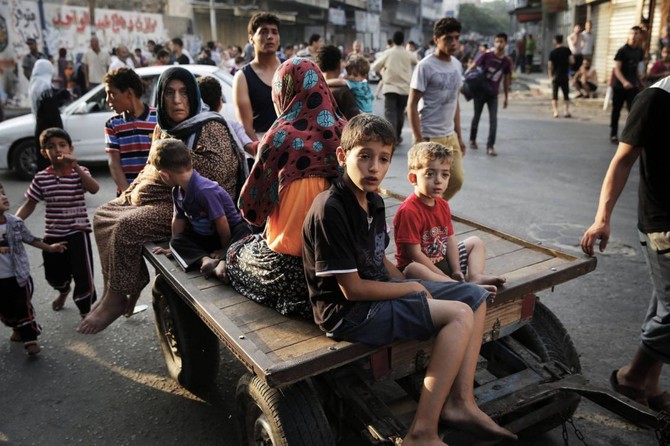
- Since January, US financing for humanitarian programs serving the Palestinians has been suspended
- Trump has threatened to withhold hundreds of millions of dollars in aid to force the Palestinians back to the negotiating table with Israel
Blinken heads to Jordan to push Gaza aid
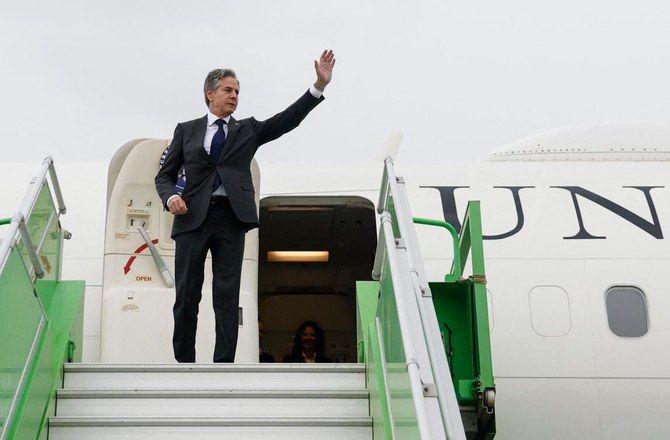
- Blinken flew to Amman after talks with Gulf Arab leaders in Riyadh
- The US top diplomat will meet Jordan’s King Abdullah II and Foreign Minister Ayman Safadi
RIYADH: US Secretary of State Antony Blinken headed Tuesday to Jordan where he will discuss ways to boost aid deliveries into Gaza and quietly thank the kingdom for its help during recent Iran-Israel clashes.
Blinken flew to Amman after talks with Gulf Arab leaders in Riyadh, part of his seventh tour of the region since the October 7 attack by Hamas on Israel.
The US top diplomat will meet Jordan’s King Abdullah II and Foreign Minister Ayman Safadi as well as the UN humanitarian aid and reconstruction coordinator for Gaza, Sigrid Kaag.
Later in the day, Blinken will head to Israel where he will discuss the latest negotiations aimed at securing a temporary ceasefire and a release of hostages.
President Joe Biden’s administration, despite criticism abroad and rising fury on US university campuses, has supported Israel in its relentless campaign against Hamas but also urged its ally to do more to protect civilians.
“President Biden has insisted that Israel take specific, concrete, measurable steps to better address humanitarian suffering, civilian harm and the safety of aid workers in Gaza,” Blinken told Gulf Arab foreign ministers in Riyadh on Monday.
“We have seen measurable progress in the last few weeks, including the opening of new crossings, an increased volume of aid delivery to Gaza and within Gaza, and the building of the US maritime corridor, which will open in the coming weeks,” Blinken said.
“But it is not enough. We still need to get more aid in and around Gaza,” he said.
Biden warned Israel that future support was at stake after an April 1 Israeli strike killed seven aid workers from World Central Kitchen, the charity founded by celebrity Spanish-American chef Jose Andres.
The United States said that Israel has since taken steps to avoid such deaths in the future, including coordinating more directly with aid groups working in Gaza.
But the situation remains dire in Gaza, where the vast majority of residents have fled their homes and the United Nations has warned of looming famine.
The Biden administration is addressing the crisis by building a temporary pier to bring in aid, an extraordinary step to deal with concerns about a friendly country and major recipient of US assistance.
Jordan, which has diplomatic relations with Israel and a large Palestinian population, is especially sensitive to tensions in the Palestinian territories.
Earlier in April, Jordan shot down Iranian drones fired at Israel in response to a deadly air strike on the Iranian consulate in Syria.
Jordan, while working with the United States, has insisted that it does not want to be caught in the middle of the conflict.
Houthis claim attack on Greek merchant vessel off Yemen
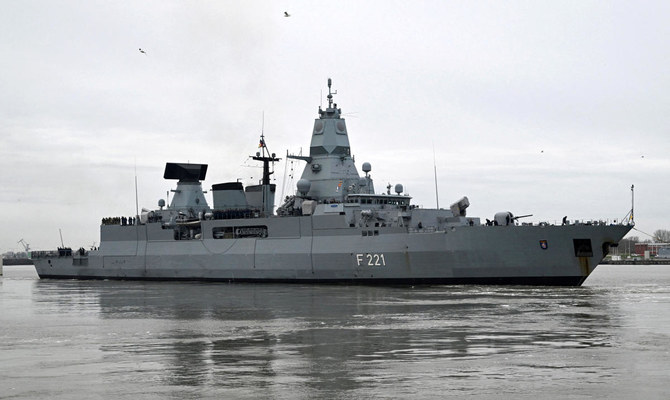
- Houthis had targeted MV Cyclades with three anti-ship ballistic missiles and three drone strikes
- Earlier, the UKMTO reported explosions near a commercial ship sailing off the Yemeni coast northwest of Mokha
DUBAI: Yemen’s Houthis claimed responsibility for attacks on Monday along the Red Sea shipping route, including on a Greek commercial vessel, according to a British maritime agency and the US military.
The US Central Command, or CENTCOM, said the Houthis had targeted MV Cyclades, a Greek commercial vessel flying the Maltese flag, with three anti-ship ballistic missiles and three drone strikes.
“Initial reports indicate there were no injuries and the vessel continued on its way,” CENCOM posted on X, formerly Twitter.
Earlier, the UK Maritime Safety Agency (UKMTO) reported explosions “in close proximity” to a commercial ship sailing off the Yemeni coast northwest of Mokha.
“Vessel and crew are reported safe,” the agency, run by the Royal Navy, added.
Maritime security firm Ambrey said the Malta-flagged container ship was en route from Djibouti to Jeddah and was likely targeted “due to its listed operator’s ongoing trade with Israel.”
Houthi militia claimed responsibility for firing at the Cyclades, MSC Orion and two US vessels.
The Iran-backed group, which controls the Yemeni capital Sanaa and much of the country’s Red Sea coast, has launched a flurry of attacks against ships since November.
It says their campaign is in solidarity with Palestinians amid the Gaza war.
CENTCOM also said that US forces shot down an unmanned aerial vehicle (UAV) over the Red Sea on Monday morning as it was headed on a flight path “toward USS Philippine Sea and USS Laboon.”
“The UAV presented an imminent threat to US, coalition, and merchant vessels in the region,” it wrote on X, adding that there had been no injuries or damage reported by US forces or nearby commercial ships.
Since January, the United States and Britain have launched repeated strikes on Houthi targets in Yemen in response to the ship attacks.
Hamas prepares response to Gaza truce offer
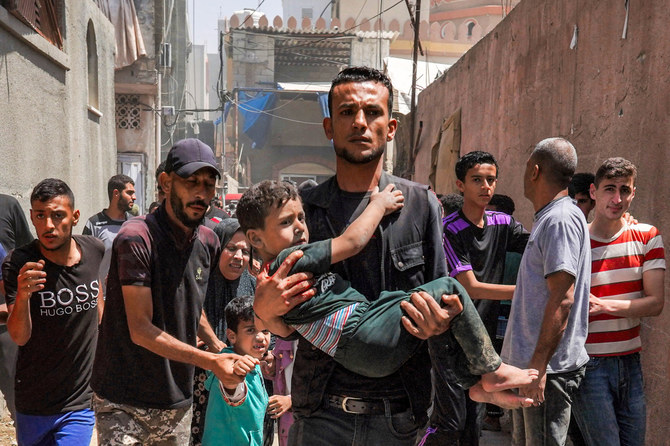
- Returning to Qatar after the latest talks in Cairo, the Hamas delegation said it would “discuss the ideas and the proposal”
JERUSALEM: Hamas was studying Tuesday Israel’s offer of a 40-day truce in the war in the Gaza Strip in exchange for the release of scores of hostages held since the Palestinian militant group’s October 7 attacks.
Returning to Qatar after the latest talks in Cairo, the Hamas delegation said it would “discuss the ideas and the proposal... we are keen to respond as quickly as possible,” a Hamas source told AFP on condition of anonymity.
Egyptian sources told Al-Qahera News, a site linked to Egyptian intelligence services, that the Hamas delegation would “return with a written response.”
US Secretary of State Antony Blinken described the truce terms as “extraordinarily generous,” while the White House asked fellow mediators Egypt and Qatar to increase pressure on Hamas to accept the latest push to halt the nearly seven-month-old war.
According to Monday night call readouts, US President Joe Biden urged the Egyptian and Qatari leaders “to exert all efforts to secure the release of hostages held by Hamas,” calling this “the only obstacle” to securing relief for civilians in the besieged strip.
For months, Egypt, Qatar and the United States have been trying to secure a new agreement between the combatants. A one-week truce in November saw 80 Israeli hostages exchanged for 240 Palestinians held in Israeli prisons.
Relentless Israeli bombardment has meanwhile devastated Hamas-run Gaza, flattening much of the territory and bringing its people to the brink of famine, while threatening to unfurl into a wider regional conflict.
In the far southern city of Rafah, Palestinians despaired over the war while searching for victims of the latest strike.
“Civilian individuals with no ties to Hamas or any other group were struck by a rocket, torn apart,” Um Louay Masri said at a destroyed building where children were being pulled out from underneath the rubble. “Why did this occur?“
To global alarm, Israel has vowed to go after Hamas battalions in Rafah, where the majority of Gaza’s 2.4 million people have sought refuge.
But Foreign Minister Israel Katz said over the weekend the government may “suspend” that operation if a truce is reached.
Blinken’s Mideast tour
Speaking in Riyadh on his seventh visit to the region since the start of the war in Gaza, top US diplomat Blinken underscored the need for Hamas to “decide quickly” on the truce.
He told a World Economic Forum special meeting that he was “hopeful that they will make the right decision.”
At the WEF meeting, Egypt’s Foreign Minister Sameh Shoukry said “the proposal has taken into account the positions of both sides.”
“We are hopeful,” he added.
British Foreign Secretary David Cameron said that Hamas has been offered a “sustained 40 days’ ceasefire, the release of potentially thousands of Palestinian prisoners, in return for the release of these hostages.”
On the sidelines of the WEF, US, European and Arab representatives met to discuss how to advance a two-state solution to the Israeli-Palestinian conflict.
Saudi Foreign Minister Prince Faisal bin Farhan told the gathering that tangible and irreversible steps toward establishing a Palestinian state would be an essential component of any durable ceasefire deal.
To incentivise Israel to support a Palestinian state, Washington has pushed the prospect of normalized Israel-Saudi relations, with Blinken suggesting Monday that some progress was being made in that arena.
Israeli Prime Minister Benjamin Netanyahu is a long-standing opponent of Palestinian statehood however, and Israel has previously rejected a permanent ceasefire.
A Hamas source has told AFP the group is keen for a deal that “guarantees a permanent ceasefire, the free return of displaced people, an acceptable deal for (a prisoner-hostage) exchange and an end to the siege” in Gaza.
Mounting pressure
Netanyahu is under tremendous pressure from the families of hostages taken by Hamas in the October 7 attack to secure their release.
On Monday, the families of two Israeli captives seen alive in a video released by Hamas last weekend called for their release.
“I demand the leaders of the free world to help us bring our people home,” said Aviva Siegel, who was freed in the November truce and is the wife of captive Keith Siegel.
Israel estimates 129 hostages remain in Gaza, including 34 believed to be dead.
Hamas’s attack resulted in the deaths of about 1,170 people in Israel, mostly civilians, according to an AFP tally based on Israeli official figures.
Israel’s retaliatory offensive has killed at least 34,488 people in Gaza, mostly women and children, according to the health ministry in the Hamas-run territory.
That tally includes at least 34 deaths in a 24-hour window, the ministry said Monday, down from a peak this month of at least 153 deaths on April 9.
At Rafah’s Al-Najjar hospital, a crowd of grief-stricken relatives jostled over the dead, shrouded in white.
“We demand the entire world to call for a lasting truce,” Abu Taha said at the hospital.
Access of aid
After an Israeli drone strike in early April killed seven workers from a US-based charity, Biden suggested to Netanyahu, for the first time, that continued US support could be conditional on protection and aid for civilians.
On Sunday, the White House said Israel was letting more aid trucks into Gaza in line with “commitments” Biden asked it to meet.
The UN has, however, continued to cite “access constraints” that significantly hinder delivery.
The US military is building a pier to help boost humanitarian supplies — an effort that the Pentagon on Monday said would cost Washington at least $320 million.
The UN has warned a heatwave and the proliferation of insects are increasing the risk for diseases at the swelling tent cities in Gaza.
“I have sick children who cannot tolerate the heat,” said Alaa Al-Saleh, a Palestinian displaced to an encampment in Rafah. “We are cramped inside the tent, rarely going outside.”
Suspected Al-Qaeda explosion kills 6 troops loyal to secessionist group in Yemen
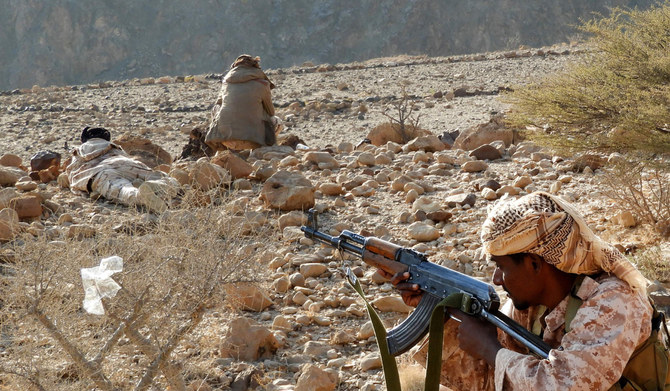
- AQAP is seen as one of the more dangerous branches of the terror group still operating more than a decade after the killing of founder Osama bin Laden
SANAA, Yemen: An explosive device detonated and killed six troops loyal to a United Arab Emirates-backed secessionist group Monday in southern Yemen, a military spokesman said, the latest attack blamed on Al-Qaeda militants in the impoverished Arab country.
The explosion hit a military vehicle as it passed in a mountainous area in the Modiyah district of southern Abyan province, said Mohamed Al-Naqib, a spokesman for the Southern Armed Forces, the military arm of the secessionist Southern Transitional Council.
Eleven other troops were wounded, he added.
It is at odds with the internationally recognized government, although they are allies in Yemen’s years long war against the Iranian-backed Houthi rebels who control the north and the capital Sanaa.
Al-Naqib blamed Al-Qaeda in the Arabian Peninsula, or AQAP, for the attack.
AQAP is seen as one of the more dangerous branches of the terror group still operating more than a decade after the killing of founder Osama bin Laden.
It is active in several regions in Yemen, exploiting the country’s civil war to cement its presence in the nation at the southern tip of the Arabian Peninsula.
Yemen’s ruinous civil war began in 2014 when the Houthis seized the capital of Sanaa and much of northern Yemen and forced the internationally recognized government into exile.
US says five Israeli military units committed abuses in West Bank
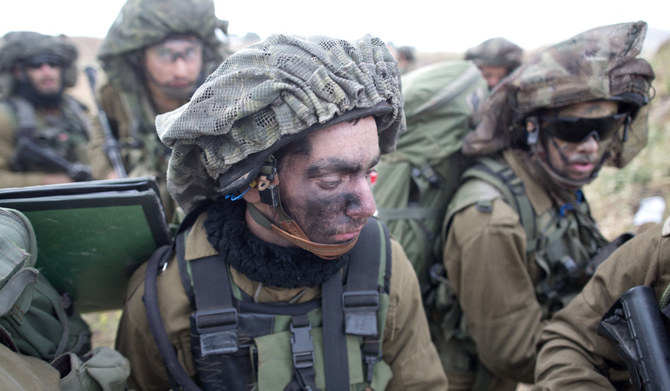
- Israel has killed more than 34,000 Palestinians, according to Gaza’s Health Ministry
- Press reports have identified a battalion called the Netzah Yehuda, composed mainly of ultra-Orthodox Jews, as being accused of abuses. It is about 1,000-strong and since 2022 has been stationed in the West Bank, which Israel has occupied since 1967
WASHINGTON: The United States has concluded that five Israeli security force units committed serious human rights violations against Palestinians in the West Bank before the Hamas attack in October, the State Department said Monday.
Israel has taken remedial measures with four of these units, making US sanctions less likely. Consultations are under way with Israel over the fifth unit, State Department deputy spokesman Vedant Patel told reporters.
He declined to identify the units, give details of the abuse, or say what measures the Israeli government had taken against them.
A US official speaking on condition of anonymity said the fifth unit is part of the army.
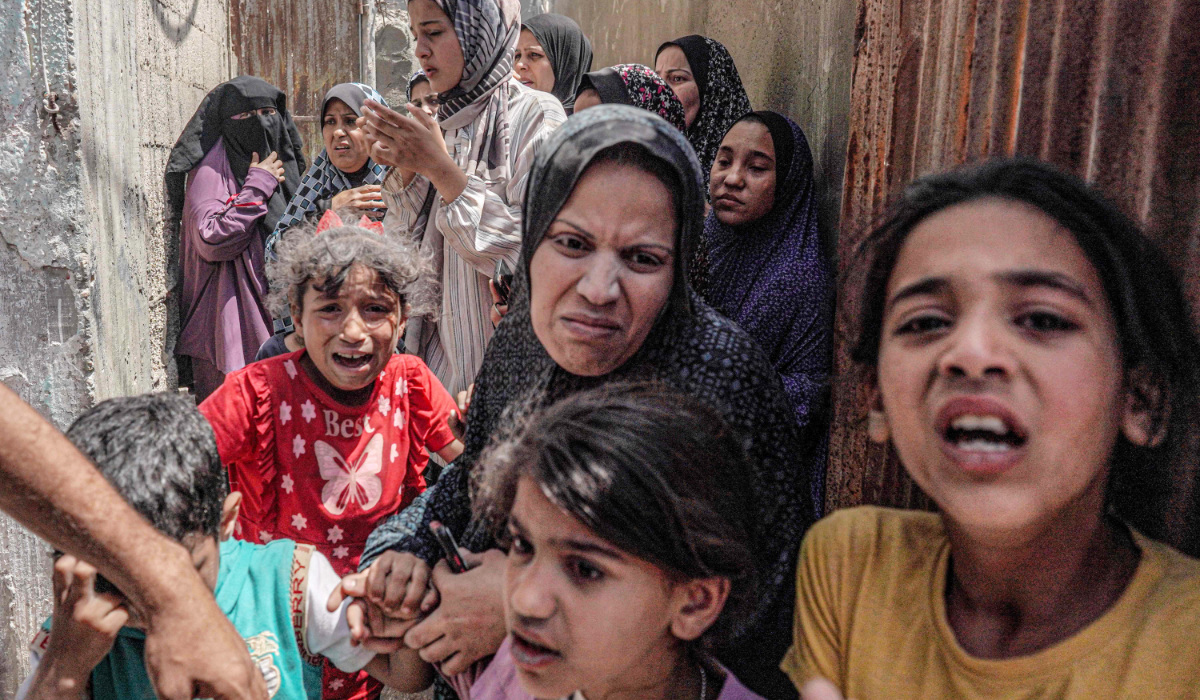
Press reports have identified a battalion called the Netzah Yehuda, composed mainly of ultra-Orthodox Jews, as being accused of abuses.
It is about 1,000-strong and since 2022 has been stationed in the West Bank, which Israel has occupied since 1967.
“After a careful process, we found five Israeli units responsible for individual incidents of gross violations of human rights,” Patel said.
All the incidents took place before the October 7 Hamas attack and were not in Gaza, he added.
“Four of these units have effectively remediated these violations, which is what we expect partners to do, and is consistent with what we expect all countries whom we have a secure relationship with,” said Patel.
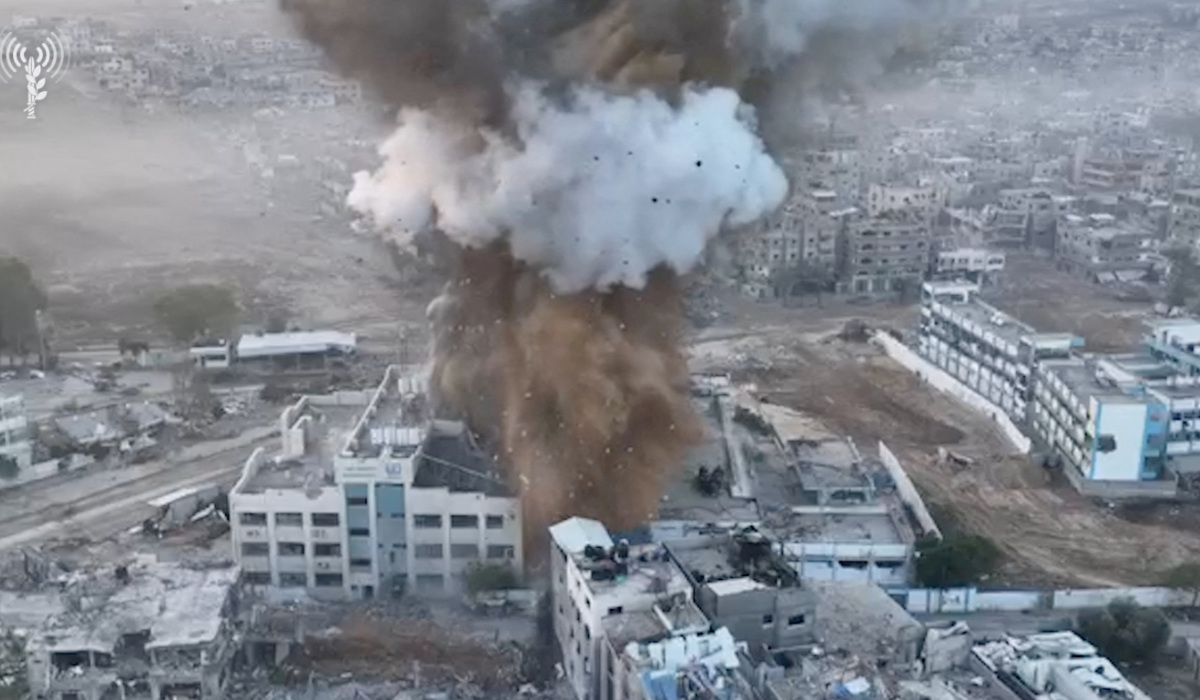
Israel has provided “additional information” about the fifth unit, he added.
US law bars the government from funding or arming foreign security forces against which there are credible allegations of human rights abuses.
The United States provides military aid to allies around the world, including Israel.
The Israeli army has been fighting the militant Palestinian group Hamas in the Gaza Strip for almost seven months and is trading fire almost every day with Hezbollah along the border with Lebanon. Both groups are backed by Iran.
Prime Minister Benjamin Netanyahu reacted angrily to recent news reports that the United States might slap sanctions against a unit of the Israeli military because of human rights abuses, saying the army should not be punished with the country at war.
Patel said the United States is continuing its evaluation of the fifth army unit and has not decided whether to deny it US military assistance.
This case comes with the administration of President Joe Biden under pressure to demand accountability from Israel over how it is waging war against Hamas, with such a high civilian death toll.
In an election year, more people are calling for the United States to make its billions of dollars in annual military aid to Israel contingent on more concern for Palestinian civilians. Pro-Palestinian protests are also sweeping US college campuses.
Hamas’ October attack in Israel resulted in the deaths of about 1,170 people in Israel, mostly civilians, according to an AFP tally based on Israeli official figures.
Israel’s retaliatory offensive has killed at least 34,488 people in Gaza, mostly women and children, according to the health ministry in the Hamas-run territory.


